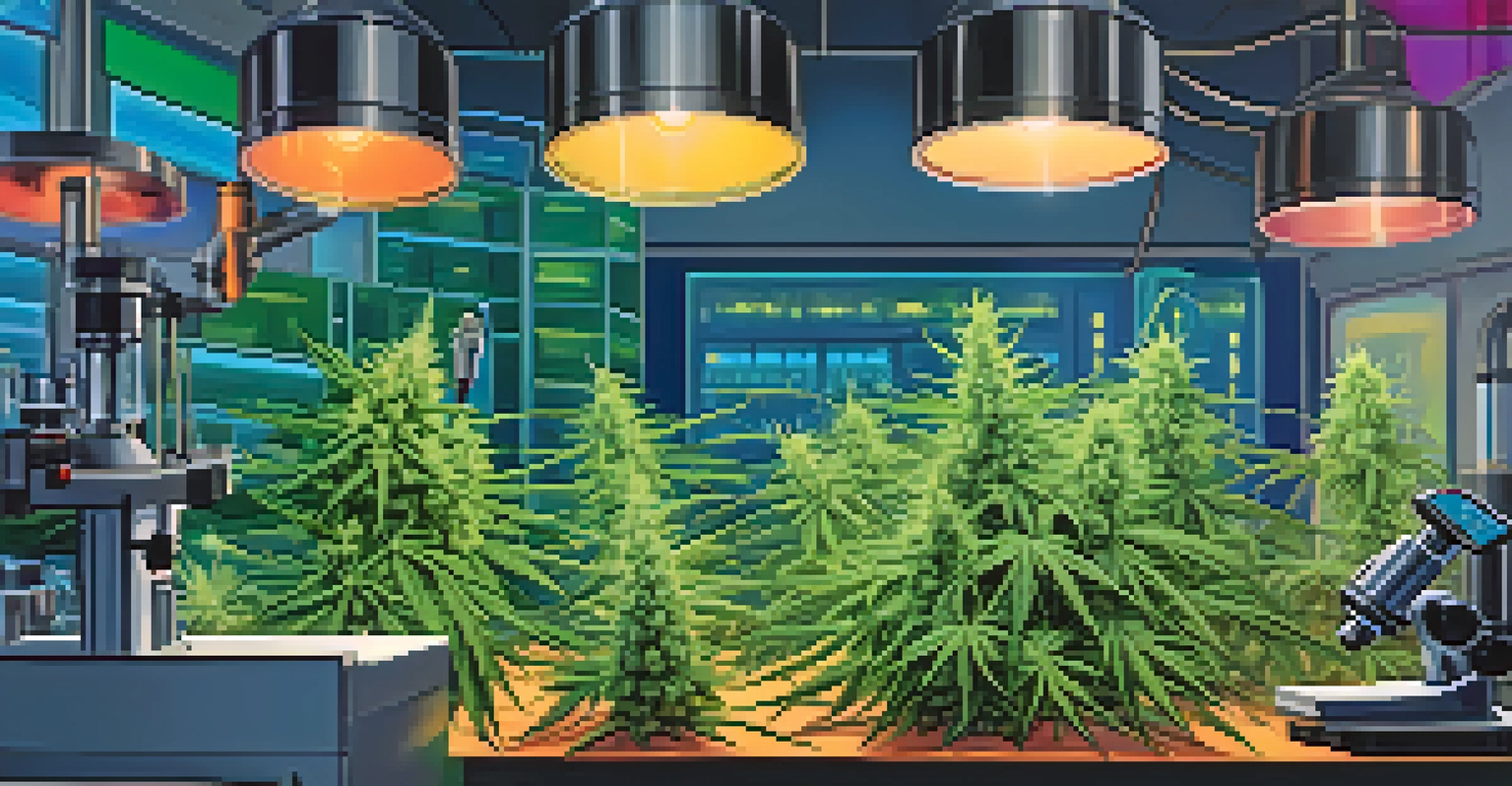Legalization of Marijuana and Its Impact on Addiction Treatment

Understanding Marijuana Legalization and Its Growing Acceptance
Marijuana legalization has gained significant traction in recent years, with many states recognizing its potential benefits. The shift from viewing marijuana solely as an illicit substance to a regulated product reflects changing societal attitudes. This transformation often sparks conversations about its broader implications, particularly in health and addiction treatment.
Marijuana is a very powerful medicine, and it can be very helpful in treating certain conditions, particularly in the area of addiction and recovery.
As more jurisdictions embrace legalization, it's crucial to understand how this shift impacts individuals struggling with addiction. Legal access can lead to both positive and negative outcomes for those in recovery. It's essential to navigate these complexities to foster an environment that supports healing and well-being.
For instance, some individuals may find relief from anxiety and chronic pain through legal marijuana use, potentially reducing their reliance on more addictive substances. However, others might be at risk of developing a dependency on marijuana itself. This duality highlights the importance of informed discussions around legalization and addiction.
The Potential Benefits of Marijuana for Addiction Treatment
One of the most compelling arguments for marijuana legalization is its potential therapeutic benefits. Research suggests that cannabinoids, the active compounds in marijuana, may assist in treating various forms of addiction, such as opioid dependence. By providing a safer alternative, marijuana could play a role in reducing the risks associated with more harmful substances.

Moreover, some studies indicate that marijuana can help mitigate withdrawal symptoms for those quitting addictive substances. This can create a more manageable recovery process, allowing individuals to focus on their healing journey. Additionally, marijuana's calming effects may help address underlying mental health issues that contribute to addiction.
Marijuana's Role in Addiction Recovery
Marijuana may offer therapeutic benefits for addiction treatment, but its use must be approached cautiously due to potential dependency risks.
However, it is important to approach this topic with caution. While marijuana may seem like a beneficial tool, it is not a one-size-fits-all solution. Each individual's experience with addiction is unique, necessitating a personalized approach to treatment.
Challenges and Concerns Related to Marijuana Use in Recovery
Despite its potential benefits, the use of marijuana in addiction treatment raises several concerns. For some individuals, marijuana can become a substitute addiction, leading to the same patterns of dependency that they sought to escape. This risk highlights the need for careful monitoring and support during recovery.
The cannabis plant has been used as a treatment for addiction for thousands of years, and we are now beginning to understand its potential role in the recovery process.
Additionally, the stigma surrounding marijuana use can complicate treatment options. As some people still associate marijuana with illicit behavior, those in recovery may feel judged or misunderstood. This stigma can discourage individuals from openly discussing their marijuana use, potentially hindering their recovery journey.
It's also important to consider the quality and purity of marijuana products. With many products on the market, not all are created equal, and some may contain harmful additives. Ensuring safe access to high-quality marijuana is crucial for those who choose this path in their recovery.
The Role of Education and Awareness in Addiction Recovery
Education plays a vital role in shaping perceptions around marijuana and its use in addiction treatment. By providing accurate information, we can help individuals make informed decisions about their recovery options. This includes understanding the potential benefits and risks of using marijuana as part of their treatment plan.
Awareness campaigns can also help destigmatize the conversation around marijuana use in recovery. By fostering open dialogue, individuals may feel more comfortable discussing their experiences and seeking help. This can ultimately lead to improved outcomes for those struggling with addiction.
Education Reduces Stigma in Recovery
Increasing awareness and education about marijuana can help destigmatize its use in recovery, allowing individuals to make informed decisions.
Furthermore, healthcare professionals need to stay informed about the evolving landscape of marijuana legalization and its implications for treatment. This knowledge equips them to guide their patients effectively, ensuring that they receive the support they need on their journey to recovery.
Case Studies: Successful Integration of Marijuana in Recovery
Examining case studies can offer valuable insights into the integration of marijuana in addiction recovery. For example, some rehabilitation centers have begun incorporating marijuana as part of their treatment plans, recognizing its potential benefits. These programs often focus on personalized approaches, tailoring treatment to each individual's needs.
In certain cases, individuals have reported significant improvements in their recovery outcomes after using marijuana. They often cite reduced cravings for harder substances and improved mental well-being. These anecdotes can serve as powerful testimonials to the effectiveness of including marijuana in addiction treatment.
However, it's essential to approach these case studies with a critical eye. While they provide valuable insights, each person's experience is distinct. Further research is necessary to develop standardized guidelines for using marijuana in addiction recovery.
Legal Frameworks and Their Impact on Addiction Treatment Options
The legal landscape surrounding marijuana significantly influences its role in addiction treatment. As more states legalize marijuana, the availability of treatment options expands. This shift can lead to the development of new programs and therapies that incorporate marijuana as a tool for recovery.
Conversely, restrictive laws can limit access to potentially beneficial treatments. In some areas, individuals may still face legal repercussions for using marijuana, even for medicinal purposes. This inconsistency can create barriers to recovery and discourage individuals from exploring all their options.
Legal Frameworks Shape Treatment Options
The evolving legal landscape around marijuana significantly impacts access to addiction treatment options and the development of recovery programs.
As legislators continue to evaluate marijuana policies, it's crucial to consider the implications for addiction treatment. Developing a legal framework that promotes safe access while ensuring patient protection is essential for fostering effective recovery environments.
Looking Ahead: The Future of Marijuana and Addiction Treatment
As we look to the future, the intersection of marijuana legalization and addiction treatment is likely to evolve further. Ongoing research will continue to shed light on the effectiveness of marijuana in treating various forms of addiction. This knowledge could lead to the development of new therapies and approaches that incorporate cannabis.
Additionally, as societal perceptions of marijuana continue to shift, we may see increased acceptance of its use in recovery. This could pave the way for more comprehensive treatment options that consider the unique needs of individuals struggling with addiction.

Ultimately, the future will depend on our ability to balance the benefits and risks associated with marijuana use in addiction treatment. By fostering open dialogue, supporting research, and developing sound policy, we can create a more informed and compassionate approach to recovery.